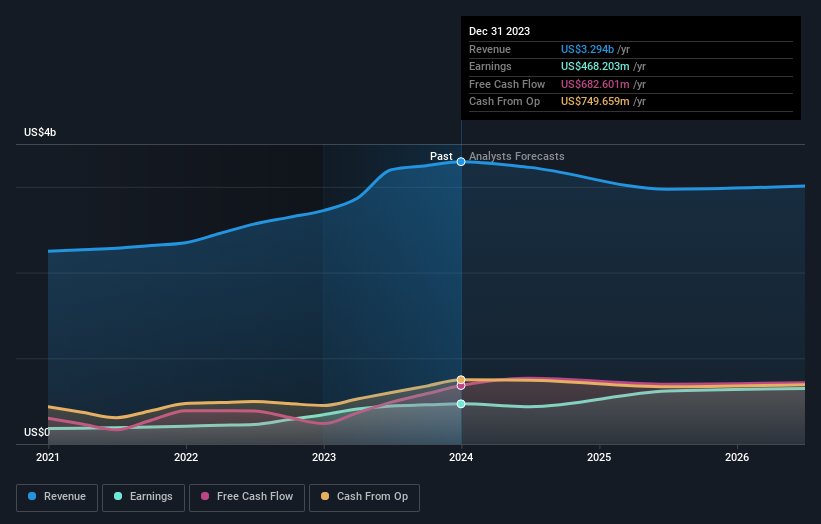Stock Analysis
- Australia
- /
- Professional Services
- /
- ASX:CPU
Institutions profited after Computershare Limited's (ASX:CPU) market cap rose AU$1.2b last week but retail investors profited the most

Key Insights
- Significant control over Computershare by retail investors implies that the general public has more power to influence management and governance-related decisions
- The top 25 shareholders own 48% of the company
- 48% of Computershare is held by Institutions
A look at the shareholders of Computershare Limited (ASX:CPU) can tell us which group is most powerful. We can see that retail investors own the lion's share in the company with 48% ownership. Put another way, the group faces the maximum upside potential (or downside risk).
While retail investors were the group that reaped the most benefits after last week’s 7.8% price gain, institutions also received a 48% cut.
Let's take a closer look to see what the different types of shareholders can tell us about Computershare.
View our latest analysis for Computershare

What Does The Institutional Ownership Tell Us About Computershare?
Many institutions measure their performance against an index that approximates the local market. So they usually pay more attention to companies that are included in major indices.
We can see that Computershare does have institutional investors; and they hold a good portion of the company's stock. This suggests some credibility amongst professional investors. But we can't rely on that fact alone since institutions make bad investments sometimes, just like everyone does. When multiple institutions own a stock, there's always a risk that they are in a 'crowded trade'. When such a trade goes wrong, multiple parties may compete to sell stock fast. This risk is higher in a company without a history of growth. You can see Computershare's historic earnings and revenue below, but keep in mind there's always more to the story.

Hedge funds don't have many shares in Computershare. Australian Super Pty Ltd is currently the company's largest shareholder with 11% of shares outstanding. State Street Global Advisors, Inc. is the second largest shareholder owning 6.3% of common stock, and BlackRock, Inc. holds about 6.2% of the company stock.
A deeper look at our ownership data shows that the top 25 shareholders collectively hold less than half of the register, suggesting a large group of small holders where no single shareholder has a majority.
While it makes sense to study institutional ownership data for a company, it also makes sense to study analyst sentiments to know which way the wind is blowing. Quite a few analysts cover the stock, so you could look into forecast growth quite easily.
Insider Ownership Of Computershare
While the precise definition of an insider can be subjective, almost everyone considers board members to be insiders. Management ultimately answers to the board. However, it is not uncommon for managers to be executive board members, especially if they are a founder or the CEO.
Insider ownership is positive when it signals leadership are thinking like the true owners of the company. However, high insider ownership can also give immense power to a small group within the company. This can be negative in some circumstances.
We can see that insiders own shares in Computershare Limited. The insiders have a meaningful stake worth AU$708m. It is good to see this level of investment. You can check here to see if those insiders have been buying recently.
General Public Ownership
The general public-- including retail investors -- own 48% stake in the company, and hence can't easily be ignored. While this size of ownership may not be enough to sway a policy decision in their favour, they can still make a collective impact on company policies.
Next Steps:
It's always worth thinking about the different groups who own shares in a company. But to understand Computershare better, we need to consider many other factors. Be aware that Computershare is showing 1 warning sign in our investment analysis , you should know about...
Ultimately the future is most important. You can access this free report on analyst forecasts for the company.
NB: Figures in this article are calculated using data from the last twelve months, which refer to the 12-month period ending on the last date of the month the financial statement is dated. This may not be consistent with full year annual report figures.
Valuation is complex, but we're helping make it simple.
Find out whether Computershare is potentially over or undervalued by checking out our comprehensive analysis, which includes fair value estimates, risks and warnings, dividends, insider transactions and financial health.
View the Free AnalysisHave feedback on this article? Concerned about the content? Get in touch with us directly. Alternatively, email editorial-team (at) simplywallst.com.
This article by Simply Wall St is general in nature. We provide commentary based on historical data and analyst forecasts only using an unbiased methodology and our articles are not intended to be financial advice. It does not constitute a recommendation to buy or sell any stock, and does not take account of your objectives, or your financial situation. We aim to bring you long-term focused analysis driven by fundamental data. Note that our analysis may not factor in the latest price-sensitive company announcements or qualitative material. Simply Wall St has no position in any stocks mentioned.
About ASX:CPU
Computershare
Computershare Limited provides issuer, employee share plans and voucher, business, communication and utilities, technology, and mortgage and property rental services.
Solid track record with excellent balance sheet and pays a dividend.

